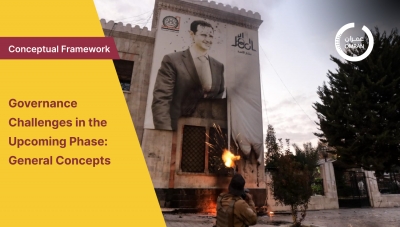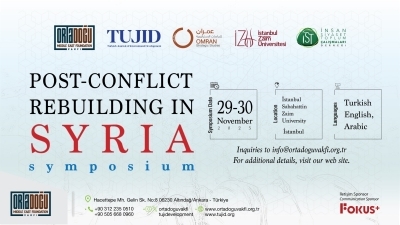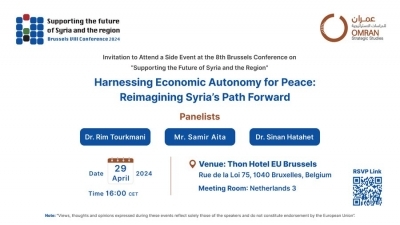Introduction
There is no doubt that the success of the Military Command in overthrowing the Assad regime depended on several factors, not least of which were military preparation and training. However, there are other essential and objective factors that were no less significant, even if they were not directly apparent. One such factor is the decline and collapse of public services and governance in regime-controlled areas, alongside the widespread corruption. In contrast, the general conditions in areas under the control of the Salvation Government demonstrated an ability to deliver services and achieve swift justice in a manner consistent with local societal values, providing these areas with a competitive advantage.
The relative success of the Salvation Government in governance before the fall of the regime can be attributed to the following factors:
- Discipline and the Moral Code of Personnel: This factor may seem weak within traditional governance literature, but it played a crucial role during the siege and war endured by the region. A cohesive Moral Code helped maintain order and limit chaos.
- Reducing Governance Layers: By exercising direct authority with the population. This required providing citizens with close access to decision-making centers without passing through multiple administrative layers, particularly in judicial matters.
- Government Focus on Regulation: while leaving service provision to non-governmental organizations and the private sector. This approach saved essential resources for the government and allowed their allocation to developmental purposes, even under conditions of war and siege. It is worth noting that many fundamental governance functions, such as statistical tools and planning, remained suspended as they were considered secondary priorities.
- A High Degree of Alignment with Local Cultural and Religious Values: The government’s value framework and the religious and ethical references of the population were in close alignment; this enhanced the government’s ability to manage societal disputes and balancing varying interests through coordination with existing community leaders and local societal structures.
- Monetary Control of a Small Economy: the control of economy in a contained geographical area was relatively easy and manageable; it allowed for direct supervision and regulation of money flow, and helped curb inflation to some extent.
As a result, essential and critical expertise was accumulated, which may prove beneficial in various areas of state management in the future. However, these experiences cannot be directly transferred when expanding the governance framework from Idlib to the rest of Syrian territory without reconsidering several fundamental factors and adjusting assumptions.
Key Challenges in Expanding Government Operations
The government will face immediate, medium-term, and long-term challenges in the upcoming phase, which cannot be addressed by merely extrapolating the Idlib experience to the rest of the country. Instead, there is a need to delve deeply into the structural reasons behind Idlib’s success rather than focusing solely on its technical modalities, due to the following reasons:
- The moral code, self-regulation, and cohesion that characterized the governance bodies in Idlib will not be available in governance structures plagued by neglect, corruption, and nepotism. Furthermore, the competent individuals within these structures will still require indirect monitoring mechanisms, which cannot be provided by the direct oversight methods that the Salvation Government traditionally relied on to combat corruption. Syria’s administrative structure will require approximately 2,000 senior national level managers and around 10,000 mid-level managers. The central authority, represented by the current Interim Government (comprised mainly of personnel from the Salvation Government), will not be able to monitor them directly. The new government will face significant challenges in selecting, training, monitoring, and holding personnel accountable through intermediary oversight mechanisms. These oversight systems, such as the Central Commission for Control and Inspection and the Central Financial Control Authority during the previous regime, were among the core pillars of corruption. Each time an intermediary governance level is introduced to combat corruption, it must itself be monitored; otherwise, it risks becoming part of the corruption system.
- There is no doubt that the traditional structure of local administration in Syria requires a comprehensive reassessment of its levels, size, and administrative divisions. In Idlib, the Salvation Government abolished the governorate level in administration, opting instead to manage major municipalities (each roughly the size of a subdistrict). This approach cannot be replicated in other governorates, and efforts must be made to unify local administrative levels to ensure consistency. The government, operating from Damascus, will not be able to exert centralized control, nor will it be feasible to consolidate smaller municipalities into larger ones across all governorates at once, particularly given the legacies of the conflict and the divisions left by years of strife among local communities. At the same time, the country cannot be managed in an asymmetrical manner.
- Non-governmental organizations have been able to provide essential and high-cost services, such as healthcare and certain educational services, through resources provided by Syrian expat communities abroad and international donors. However, it will not be possible to significantly expand these resources. Until the central government can sustainably provide these resources to local communities, a critical challenge will lie in the fair and transparent distribution of incoming resources to Syria. The provision of services will significantly determine the new government’s acceptability in the not-so-distant future. The government will need approximately $10 billion annually to restore basic infrastructure and provide services at an acceptable level. Donor funding of this scale will not be available, and the initial contributions made by Qatar and Turkey will not suffice to meet these needs in the long term.
- Balancing societal interest will pose a significant challenge in areas where cultural and ethical values do not align with the government's moral foundations. Syrian communities cannot be governed solely on the basis of overt religious and ethnic allegiances, as each group has its own contradictory social levers and customs representing competing interests and clashing local leadership and patronage networks (many of which transcend specific ethno-sectarian groups). Agreements with certain community leaders will not guarantee the satisfaction of other leaders. Thinking in terms of ethno-sectarian groups will place the new government in unfamiliar dilemmas, unlike those faced in Idlib, where religious and cultural groups were relatively limited in geographic and spatial terms. Disputes and competition within local communities will consume the administration’s time and cause stresses unless sufficient space is allocated for local communities to engage in dialogue and negotiate the representation of their diverse and conflicting voices in the future.
- The recovery of the Syrian economy will; be another key issue. Syria’s economy is diverse and complex; it cannot be managed using the inflation control tools applied in Idlib. There will be significant demand for consumer goods in the upcoming phase, with the commercial and industrial sectors competing to meet these needs (the former advocating for lifting customs restrictions, while the latter initially seeking protectionist measures). This competition will, in turn, generate demand for various financial operations, which the government must balance through centralized regulatory mechanisms. Even if financial transactions were managed by the private sector within a free market system, foreign exchange management and national balancing of the accounts will be necessary to control inflation. Currently, the sharp demand for the Syrian pound, driven by the return of refugees and expatriates, has supported the stability of the currency. However, once reconstruction and investment activities begin, the volume of financial resources in the markets will cause rapid flow of cash into the markets and will induce significant inflation (though foreign exchange rates may remain stable). While this growth will eventually create job opportunities and enable Syrian families to regain their economic capacities, the benefits of this economic growth will spread slowly compared to the anticipated rise in inflation. This means that approximately 60% of the population will face the risk of food insecurity in the short to medium term. A rapid safety net must be established to prevent public dissatisfaction with the current government from escalating into widespread discontent within a few weeks.
- Reconstruction will require resources that are currently unavailable and unlikely to be secured through donor contributions, particularly in light of ongoing sanctions (with over-compliance with sanctions, extending far beyond their literal terms). GDP estimates have dropped from $58 billion in 2011 to around $20–22 billion today (considering that part of today’s GDP is linked to the war economy, non-militarized economy may actually not exceed $18 billion). The current economy is highly contracted, and investments in reconstruction will create significant opportunities for accelerated growth as well as risks of growth happening at the expense of vulnerable groups, as noted above. To recover the lost GDP, Syria will require annual growth of approximately 6–7%, which is achievable initially in a contracted economy that suddenly opens up to new investments (albeit with the accompanying risks of inflation). However, this growth rate will taper off over time and cannot be sustained beyond 4–5% in subsequent years, even under the best circumstances. Consequently, recovering lost GDP will not likely be achievable before 2040, even with open investment markets.
The losses to the Syrian economy can be divided into three components:
- Direct material losses: Estimated at around $125–150 billion, representing the value of destroyed assets, including housing, services, infrastructure, factories, and more.
- Indirect economic losses: Estimated at approximately $200–300 billion, representing the loss of production that could not be realized due to direct material losses.
- Lost opportunity costs: Estimated at roughly $400 billion, representing the value of potential growth that could have been achieved if the revenues lost to economic damage had been reinvested in the Syrian economy.
At best, the Syrian economy could recover the first two components within 15–20 years. However, this projection requires a delicate balance between demands for growth with social protection needs. Tax rates must be calculated with precision to encourage investment on one hand, while also ensuring the provision of public services to safeguard social welfare and support pro-poor growth on the other. The new government's announcement of a free market and minimal taxation would reassure investors, but it risks sparking a hunger uprising if socially and legally acceptable frameworks for social solidarity and guarantees for protecting the most vulnerable groups are not set up soon.
Balancing Stability and Legitimacy
The Salvation Government acquired the de-facto legitimacy to manage the Interim Government under what is referred to in constitutional literature as revolutionary legitimacy. This form of legitimacy allows it to lead the transitional phase under the banner of maintaining stability. However, legitimacy has another dimension—legality or de jure legitimacy—derived from the coherence of the governance system, starting with the constitution, followed by laws, and ending with implementation and community participation. Without the de facto legitimacy, the de-jure one will not likely be established, and without de-jure legitimacy, the de-facto one will not endure politically and will become meaningless.
There are fundamental issues that must be addressed to provide mechanisms for building de jure legitimacy in line with the structural challenges the new government will face in the coming phase. These include:
- Establishing constitutional legitimacy and national dialogue: This should be conducted within a participatory and inclusive framework. Although this process may take time to mature, it must begin swiftly.
- Economic recovery and restoration of services: This is the most significant challenge and includes ensuring salaries and wages not only for public sector employees. Raising public sector salaries alone will create inflation in other sectors that cannot be contained in the short term.
- Reforms to the local administration system and the organization of local councils' operations: Governance systems have developed differently across various areas, even within regime-controlled zones, where each region was managed according to distinct local parameterss despite the existence of a unified legal text in the form of Decree 107 of 2011.
- Organizing Civil Society Operations: Establishing practical partnerships with non-governmental organizations to provide a social safety net is crucial. This does not mean limiting civil organizations to relief work. While relief efforts are urgently needed in the short term, such work does not generate economic multipliers or create job opportunities. It is essential not to rely entirely on relief efforts. Civil society organizations are a fundamental part of creating a positive environment for the return of investment in Syria and should not be restricted solely to charitable activities.
- Reconstruction of Cities and Towns: Many cities and towns will require rapid preparation to regulate construction activities, ensure public safety, protect public property, and provide infrastructure. The Syrian planning system is not equipped to quickly address these challenges, particularly as, in recent years, it has shifted its focus toward real estate development projects while neglecting the right to housing for displaced populations.
- Community Reconciliation: Transparent and localized mechanisms are essential for addressing issues of social peace. These mechanisms must engage with existing community structures in all their diversity and avoid reducing them to a single type of sectarian leadership.
Subsequent papers will be issued to outline these mechanisms in detail and foster dialogue around their activation.




